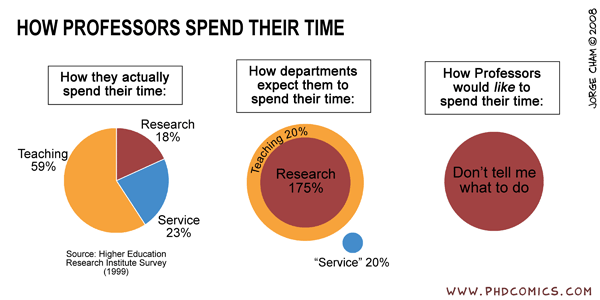Ever since 2nd year of grad school, I have been consistently working 80 hour weeks - no exaggeration (~8 AM - 6 PM, and then 8 PM - 12 PM M-F) and then 5 hours or so Saturday morning and Sunday night!
I love what I do but it's getting emotionally and physically difficulty to keep up this schedule, not to mention it is hard to keep up with other responsibilities well (like family, friends, and health)... although I think the worst part is the constant thinking about work all the time and feeling like there's something that I should be doing (because there's always something on my to do list, no matter how much work I do - it's almost like work generates more work in academia)
Question for those of you that are out of grad school and academia:
1. Does it ever get better?
2. Is this what you need to get a tenure-track job and eventually tenure? Because as much as I love what I do, I think if I have to keep working these hours it will come with a lot of sacrifices that may not be worth it until the end.
3. How many hours did you work in grad school, post-doc, and then tenure-track or AMC jobs?
4. Any tips on managing the "constantly having to be working" feeling - I feel like if this continues it will wreck my personal life (my husband is already sick of this attitude, he's totally fine with long hours but not the stress that they cause) and health
I am curious about these questions because all of this constant work and stress (publish! publish! get lots of hours!) is making me seriously question a research career, despite the fact that there's no work that I love more than the research that I do. I am totally fine with it if I have to put in my dues for a couple of years to set me on the right track, but I do not think this is worth if it will be this way in the long term.
I love what I do but it's getting emotionally and physically difficulty to keep up this schedule, not to mention it is hard to keep up with other responsibilities well (like family, friends, and health)... although I think the worst part is the constant thinking about work all the time and feeling like there's something that I should be doing (because there's always something on my to do list, no matter how much work I do - it's almost like work generates more work in academia)
Question for those of you that are out of grad school and academia:
1. Does it ever get better?
2. Is this what you need to get a tenure-track job and eventually tenure? Because as much as I love what I do, I think if I have to keep working these hours it will come with a lot of sacrifices that may not be worth it until the end.
3. How many hours did you work in grad school, post-doc, and then tenure-track or AMC jobs?
4. Any tips on managing the "constantly having to be working" feeling - I feel like if this continues it will wreck my personal life (my husband is already sick of this attitude, he's totally fine with long hours but not the stress that they cause) and health
I am curious about these questions because all of this constant work and stress (publish! publish! get lots of hours!) is making me seriously question a research career, despite the fact that there's no work that I love more than the research that I do. I am totally fine with it if I have to put in my dues for a couple of years to set me on the right track, but I do not think this is worth if it will be this way in the long term.

